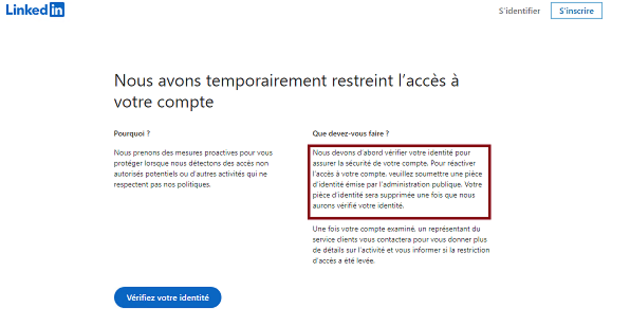Let’s remove anonymity on the Internet – ZDNet


Now that I have your attention, let’s talk seriously about the subject. I confess that I deliberately used a very scrappy title, but, thanks to the magic of algorithms, we other authors, publishers and creators, suffer from a certain lack of visibility. So, in war as in war, let’s take out the weapons.
Kind reminder of the fundamentals
Whether your name is Claire Martin or Toto75 on a social network — since when we talk about anonymity on the Internet, we are actually targeting social networks — you are never anonymous. First of all, because there is a good chance that you will connect from your mobile network, if you are addicted to your smartphone or from your home network at home, more commonly known as “the Internet box”. So, even if your nickname is Toto75, you are easily identifiable.
Obviously, not by your next-door neighbor. But, at a minimum, by your telephone operator.
To be completely anonymous on a social network in 2023, it means using a VPN, a disposable SIM card, a ghost mailbox and an anonymous bank card. Not only will you not necessarily find this on every street corner, but it requires mental gymnastics. Moreover, to have experienced it, it also implies passing through the cracks of social networks.
Spoiler alert: As far as LinkedIn is concerned, it doesn’t work. A small error between the connection and the indicated location was enough to have an account suspended, a suspension that could only be lifted by providing a valid identity document. For Twitter, the current delirium being to push more and more towards the paid, there will always be a moment when it will be necessary to give an identity. As for Facebook or more precisely Meta, it has been a long time since the platform has asked for a more or less truthful identity.
There are still social networks such as Discord, Reddit, Telegram and decentralized social networks. There may reside a semblance of anonymity, but, depending on the user’s settings, any member can be found pretty much quickly. From then on, this topic only returns to the political news because it is a French obsession.
Flying over a nest of geeks
Let’s talk again about the issue of anonymity, because, during the committee’s consideration of the digital bill — yes, again one — it was a question of linking a user’s identity to an entity of the France-Connect type. This is not even the first time that such nonsense has been brought up. The difference is that today, we have enough hindsight on the French IT “park”, COVID having passed through there. Everyone could see our deficiencies.
The observation is clear: we are of a rather filthy nullity. So yes, compared to other countries, we can probably intone cocorico. But, when you have traveled, you realize the chasm, not only technical, but also cultural. We are not talking here about applications or services for tourists, but about everyday applications. Getting an appointment to renew identity documents could become an Olympic discipline. Problem: we would be the only ones playing. Let’s not talk about the famous registration card, apparently, it’s still Koh-Lanta. Get a civil status? It depends on the places. We are not going to talk about the Employment Center and the various social assistance offices.
Spontaneously, the two digital counters that work pretty much correctly are the taxes — essentially when it comes to paying them — and the digital safe. The rest? It doesn’t hold water. Therefore, we laugh in advance by imagining what an interconnection between France-Connect and social networks could give. We know in advance that even at 2 a.m., everything would break in the face.
Even so, we could technically do it, do we ask ourselves the question of why other countries have not done it? Except to take the Russian Federation or China or North Korea as an example, why didn’t the United States do it? They who are very paranoid, they could have been the first to take the plunge. Yet they didn’t. In France, we assume that we are smarter than everyone else combined and that Americans are necessarily bad-tempered rednecks. The reality is a little more nuanced and if even they, who put a lot of money into security, didn’t do it, maybe there were reasons. But, more fundamentally, in France, we love to fool people.
The other side of the welfare state?
France is a country that takes its citizens by the hand for just about every aspect of life, whether they like it or not. As a result, we are controlled on just about everything. The latest example is the draft law on full employment, which plans to put RSA recipients, their spouses, job seekers, recipients of the disabled adult allowance, in a single file, all centralized with France Travail.
As the state pays us three cents – the said three cents coming from the fruit of our work via our social security contributions – it feels authorized to tell us what to do permanently. Except that he himself does not fulfill his duties vis-à-vis us. At the risk of breaking the hearts of some, when we pay taxes, we would like to be able to benefit from public services. For example, justice. However, this is the heart of the problem of the anonymity of social networks. We don’t need a France-Connect thing. We need well-paid court clerks, magistrates, investigators, people who know how to draw up documents correctly to carry out procedural acts. We need the complaints to be taken and investigated. We need buildings that don’t collapse as soon as there are three drops of rain. We need the judgments to be executed within a reasonable time and not five years after the facts.
If we put the sums spent on stupid IT projects end to end — consultant fees included — I am convinced that we would have enough to pay the clerks up to € 5,000 net every month. When we know that algorithmic video surveillance is going to be used after the Olympic Games, we see that there is money. But, this money does not benefit Justice.
The day when in France, there will be a little more than one euro per person who will be devoted to Justice and not only to the penitentiary, there will no longer be a problem of anonymity on social networks or even on the Web. Because, the police officers, the magistrates, the entire judicial chain will have the means to work. And if you are interested in the topic, know that the finance bill is being examined from October 17, 2023 at the National Assembly.










